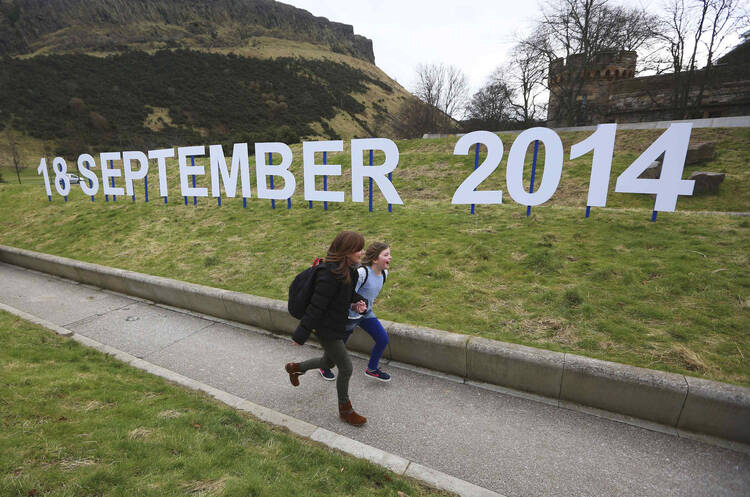Born and raised in Scotland, I left in 1979 as an “economic refugee” to live and work in London. At that time, the Scottish National Party seemed small and insignificant, so much so that some people observed that they could hold their annual party conference in a phone booth. Scroll forward 35 years, and we face the possibility of waking up on Friday to a very different political situation. Much has been said and written on reasons for voting “yes” or “no.” Those favouring independence are by no means anti-English. Despite the intense rivalry of the football pitch (and when asked, some Scots will say that they support any team playing AGAINST England!), there is generally no animosity towards those south of the border. Anger and frustration is directed towards the “Westminster elite,” the leaders of all the political parties who appear to have marginalised the very real economic and social needs of Scotland. The legacy of Thatcherism, with the demise of heavy engineering, shipbuilding and steel-making, the testing of the hated poll-tax on Scotland a year before its introduction in England, the apparent squandering of oil resources in tax cuts for the wealthy rather than rebuilding Scotland’s infrastructure, the scandal of families relying on food-banks, the debate on the morality of keeping Trident missiles…all of these have fuelled the feeling that Scots would be better off governing themselves.
The “no” campaign has been seen to be rather complacent and slow off the mark to convince people that staying in the Union would be better, not just for Scotland, but for the rest of the United Kingdom. The spectacle of party leaders rushing across the border last week, when polls indicated the campaign to be neck-and-neck, seemed to reinforce the view that Westminster has been fairly confident of a “no” vote. Though there has been much in-depth discussion in key newspapers of vital issues such as future relationships with the European Union and NATO, subsidiarity and solidarity, currency and debt, a headline in a popular newspaper the day after the announcement of another royal pregnancy—“Can the new royal baby save the Union?”—seemed to reinforce the view that many south of the border simply do not understand Scottish sentiments.
Not being resident in Scotland for many years, I do not have a vote. Though many in England complain that they have no say in whether Scotland leaves the Union, I myself am glad I do not have to decide. There are compelling reasons for voting either way.
Whatever the outcome, we will all—north and south, the “yeses” and the “noes”—have to live with the consequences. What is clear is that there has been a sea-change in political engagement with almost 100 percent registration of those eligible to vote; there has been an unprecedented level of discourse and debate at grass-roots level, particularly among younger people who at 16 have been given a vote; there have been calls for greater social and economic justice; and there has been a passionate engagement in the democratic process that other countries can only dream of. For myself, this week has me praying that the Holy Spirit will give wisdom and guidance to all who will cast a vote on Thursday, the most momentous day in at least a generation.
Helen Costigane, S.H.C.J., teaches canon law and Christian ethics at Heythrop College, University of London.








